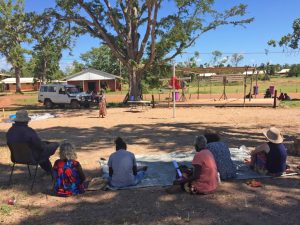Remote Engagement and Coordination Strategy: Design Phase
Funding: NT Department of Local Government and Community Services
Duration: October 2015 – June 2016
Location: Alice Springs
Report: NT Government Remote Engagement and Coordination Strategy
Summary:
Introduction
- The Remote Engagement and Coordination Strategy (RECS) was undertaken by the NT Department of Local Government and Community Services (DLGCS) in response to the identified need for the NTG to work more effectively to achieve better outcomes for remote community members.
- The context for remote engagement and coordination in the NT is intercultural, extremely complex and dynamic. RECS is an innovative strategy aimed at transforming practice within the NTG.
- The development of the RECS is over two phases:
- Design Phase
- Implementation Phase
Method
- An Inter-Agency Working Group
- Six Working Group Workshops and Pre-Workshop Research Activities
- GroundUp Method
- The Inter-Agency Working Group were from five NTG agencies (DCM, DLGCS, DoE, DHsg and PWC) and two Regional Councils (Central Desert and MacDonnell).
- The six one-day workshops attended by the Inter-Agency Working Group, Project Team members and the CDU consultant were held in Alice Springs. Workshops were facilitated by the Regional Coordinator, Remote Engagement Strategy and Community Development, DLGCS and the GroundUp consultant from the Northern Institute, CDU.
- The groundup method combined research, theory and practice to facilitate collective design; was collaborative, emergent and focused through the problems of the moment; facilitated respectful and productive negotiation of complex contexts, and cultural differences between diverse stakeholders through deliberative dialogue; unpacked assumptions and negotiated shared understanding and commitment to go on in good faith together; generated new understanding, innovative actions, pathways and solutions and was cyclic and accreting.
Outcomes
- The RECS was successfully and collaboratively designed by Project Team, an NTG Inter-Agency Working Group, Regional Councillors and CDU.
- Workshop activities provided a structured environment in which participants with a range of interests and expertise, learnt, discussed, explored, analysed and contributed to the RECS framework and elements. Ideas from within and outside government were worked together.
- In between workshops the facilitators continued working with the ideas and recommendations generated in each workshop and in the pre-WS activities, seeking additional input from Project Team members and bringing this work back to the following workshop.
- Through a cyclic and accreting process, the Strategy gradually came together and took form.
- Along with a framework that lays out the context, purpose, definitions, and underlying values and principles, three RECS Elements were finalised:
-
- Best Practice Guide for Remote Engagement and Coordination
- Levels of Remote Community Participation matrix
- Logic Models and Evaluation Frameworks for both Design and Implementation Phases.
Valuable input and significant progress was made towards achieving the remaining three Elements:
- Online Toolkit
- Remote Information and Coordination System (RICS
- Bush-Ready induction and professional learning components.
- The process of the RECS design was itself an exercise in engagement and coordination in which the WG, PT and CDU were ‘actively participating’ in its design.
- The respectful and rigorous dialogue, high level of participation, and open and honest reflection and evaluation throughout the process provided feedback that enabled us to improve workshops as we went along and gave us valuable information for planning Phase 2: Implementation.
- The input of the Regional Councillors and CDU helped to ground the Strategy in the experience of working in remote communities.
Juli Cathcart


